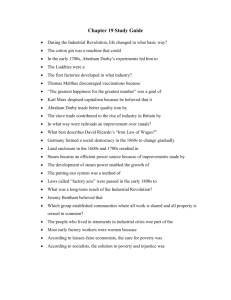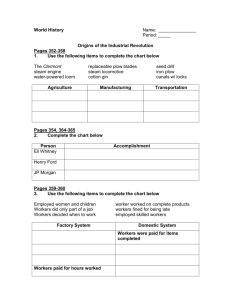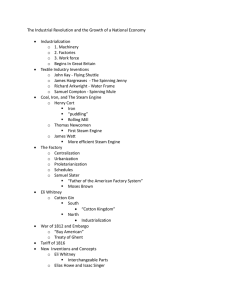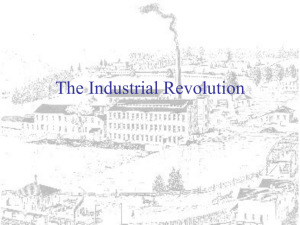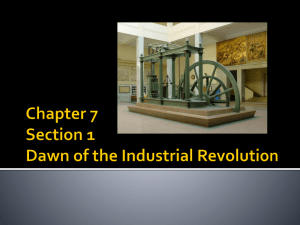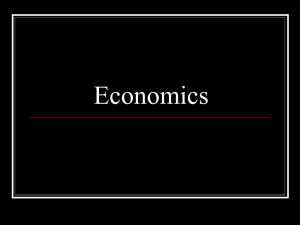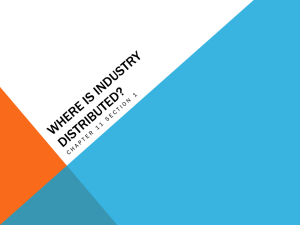Ch. 19 INDUSTRIAL REVOLUTION
advertisement
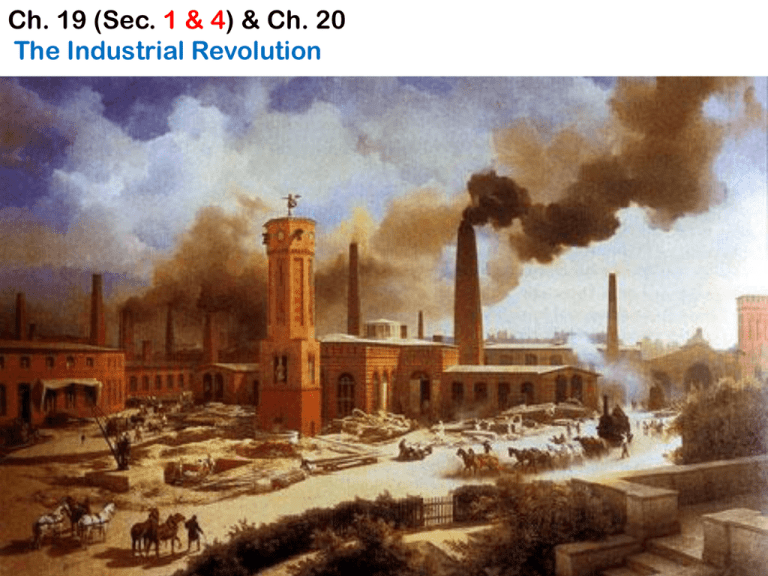
Ch. 19 (Sec. 1 & 4) & Ch. 20 The Industrial Revolution I. Stages of Ind. Rev. 1. England 1750 – 1850 textiles, railroads, iron & coal 2. Western Europe & USA 1850 - 1914 steel, chemicals, electricity, & oil Industrialization dev. of machine production of goods A. Beginnings of Ind. Rev. 1. Agricultural Rev. 1700's a. Charles Townshend “Turnip” 1730’s Crop Rotation replace nutrients in soil ex. wheat / turnips b. Gentlemen Farmers: New farm machines Jethro Tull seed drill & cultivator 1752 Robert Ransome Iron Plow 1785 Cyrus McCormick mechanical reaper / harvest grain c. Enclosure Movement fencing off public land *large scale farming tenant farmers move to city - new labor force new crop experimentation d. populations grow (more food) - diet & health improved B. Characteristics of Ind. Rev. 1. technology *machines replaced manpower 2. power sources changed ex. water to steam 3. factories developed 4. factory workers replaced skilled artisans 5. capitalists invest $$$$ 6. transportation dev. 7. cities grew population for work force C. England: “Workshop of the World” Manchester, Eng. “Cottonopolis” *1st major industrial city Factors lead to start of Ind. Rev. in England: 1. Factors of Production resources needed for industrialization a. Natural Resources land, coal, iron ore, water power, harbors b. labor supply of workers c. Capital $ to invest in business entrepreneurs willing to invest in business 2. Management administrative skills 3. Government support laws aid & protect business 4. Transportation system 5. Large markets for English products “Sun never set on British Empire” D. Textile Industry: cotton, linen, & wool 1st industry to mechanize automatic machinery New Inventions: 1. Flying shuttle John Kay 1733 sped up weaving process John Kay escaping from his home in 1753 after being attacked by local textile workers. 2. Spinning Jenny James Hargreaves 1764 *multi-spool spinning wheel sped up spinning process 3. Power Loom Edward Cartwright 1769 water powered spindles - 200 times more cloth 4. Richard Arkwright Woolpack Lane *1st Factory Nottingham, Eng. 5. Factory System *workers & machines brought together cottage industry working at home - inefficient 6. Cotton Gin Eli Whitney 1793 increased supply of cotton *key to textile industry *USA cotton producing center England imported millions of pounds from USA ex. 1701 1 mil. - 1802 60 mil - 1830 280 mil. E. Power Sources: 1. Steam Engines Thomas Newcomen 1712 *1st steam engine pump water out coal mines James Watt “The Godfather of Ind. Rev.” *modern steam engine 1760 horsepower *steam powered Ind. Rev. 2. Iron & coal *major raw materials of Ind. Rev. Henry Cort puddling removing impurities in crude iron Steel iron with impurities removed Bessemer Process Henry Bessemer 1850 blasts of cold air blown through heated iron to remove impurities manufacture steel cheaper ex. $200 a ton / $4 a ton Bessemer converter, a blast of high-pressure air oxidizes impurities in molten iron and converts it to steel. F. Transportation Revolution 1. John McAdam McAdam Roads 1816 road made of crushed stones turnpikes *tollgates to travel on 2. George Stephenson Rocket 1829 *1st Locomotive steam power ran on iron rails Liverpool to Manchester 16 miles per hour George Stephenson of the Liverpool and Manchester railway in 1829, the Rocket was the winner in the Rainhill trials—a competition sponsored by the railway to obtain a locomotive for carrying both passengers and freight. It pulled a load of three times its own weight at the rate of 20 km/hr (12.5 mph) and hauled a coach filled with passengers at 39 km/hr (24 mph). 3. Automobiles: Gottlieb Daimler *internal combustion engine 1885 *1st 4 wheel auto 1886 “Nothing but the best!” *motto The first motorcycle (1885) Karl Benz Motorwagen *1st commercial Auto. 1886 Among other things, he invented the speed regulation system known also as an accelerator, ignition using sparks from a battery, the spark plug, the clutch, the gear shift, the water radiator, and the carburetor.[1] Karl Benz's "Velo", 1894. Merger of Karl Benz's and Gottlieb Daimler's companies into the Daimler-Benz company. 1881 Rudolf Diesel diesel engine powered larger vehicles 4. Robert Fulton The Clermont *1st steamboat 1807 5. Orville & Wilbur Wright *1st airplane 1903 Wright Brothers First Flight On December 17, 1903, two brothers from Dayton, Ohio, named Wilbur and Orville Wright, were successful in flying an airplane they built. Their powered aircraft flew for 12 seconds above the sand dunes of Kitty Hawk, North Carolina, making them the first men to pilot a heavierthan-air machine that took off on its own power, remained under control, and sustained flight. National Air and Space Museum. The original plane that made the first powered flight. G. Advances in Science & Tech. 1. Alexandro Volta *1st electric battery 1800 2. Michael Faraday *electric generator Dynamo 1831 3. Samuel Morse *telegraph 1837 Samuel Morse Telegraph Receiver Used to receive the message, "What hath God wrought" during the demonstration to Congress in 1844. Smithsonian National Museum of American History 4. Cyrus Field 1866 Trans Atlantic Cable linked USA & England 5. Alexander Graham Bell *telephone 1876 Alexander Graham Bell makes the ceremonial call to open telephone service between New York and Chicago, Oct. 18, 1892. 6. Thomas Edison “The Wizard of Menlo Park” lightbulb 1879 7. Guglielmo Marconi wireless telegraph Radio 1901 radio waves across Atlantic H. New Methods of Production 1. Factory System *division of labor dividing manufacturing process - series of stages 2. Interchangeable parts - Eli Whitney guns 3. Mass production manufacturing large numbers of items exactly alike Henry Ford Assembly Line 1908 Ford Model T “Tin Lizy” I. Financing Industrial Growth 1. Corporations (body of people) business owned by many investors *stockholders A bond issued by the Dutch East India Company, dating from 1623. 2. Monopoly *total control of market particular product ex. Standard Oil Co. John D. Rockefeller “WHAT A FUNNY LITTLE GOVERNMENT.” Horace Taylor drew this political cartoon of John D. Rockefeller holding the White House and Treasury department in the palm of his hand for the September 25, 1899 issue of The Verdict. Notice the smoke from the United States Capitol in the background? It has essentially become an oil refinery, itself demonstrating the power big business held over government. 3. Investment banks Rothschild’s of Paris 1812 complex international economy James Mayer de Rothschild J. Effects of Industrialization: 1. Population Explosion 1750 Europe 140 mil. people 1850 " 260 " " 1914 " 463 " " An Essay on the Principles of Population Thomas Malthus 1798 *increase in population cause food supply to run out *overpopulation causes poverty reasons for population growth: decrease death rate fewer diseases better nutrition medical advancements increase in birth rates married younger factory work 2. Urbanization *growth of cities: factory work *greatest cause of city growth ex. England 1800 10% people lived in city -1921 80% problems of city life: poverty hunger disease no sanitation slums poor housing crime Sir Robert Peel *1st modern police force *London 1829 “Bobbies” or “Peelers” 3. factory work: wages low unskilled work long hours 12 to 16 a day / 6 days a week child labor age 5 & up female labor dangerous work no compensation 4. Industrial Capitalism *economic system based on industrial production new social structure: middle class expanded factory owners, mine owners, bankers, & merchants white collar workers managers – accountants blue collar workers factory workers lowest rank in society K. Responses to Ind. Rev. 1. Labor Unions *1st called workers assoc. *1st outlawed reforms demanded: better wages shorter hours safer working conditions unemployment insurance child labor laws Strike refusal to work *greatest tool workers used to gain rights 2. Labor reform laws: Factory Act limited length of working day 1833 children / 8 hours a day Mines Act *barred women from working in mines 1842 13 minimum age for boys work in mines Ten Hours Act 10 hr. work day 1874 II. Intellectual Developments: A. Charles Darwin On the Origin of Species 1859 *theory of evolution organic evolution plants & animals evolved simpler life forms natural selection some organisms more adaptable to their environment than others Darwin’s illustrations of beak variation in the finches of the Galápagos Islands, which hold 13 closely related species that differ most markedly in the shape of their beaks. The beak of each species is suited to its preferred food, suggesting that beak shapes evolved by natural selection. HMS Beagle 1831 British ship Darwin sailed around world exploring worlds plants & animals The Descent of Man 1871 traced human evolution from animal B. Herbert Spencer *Darwin’s assistant Social Darwinism applied Darwin’s Theory’s to human social interaction “survival of the fittest” *phrase coined by Spencer C. Sigmund Freud The Interpretation of Dreams 1900 human behavior strongly determined by our unconscious Id unconscious drives *basic needs & drives Ego the self Psychoanalysis *therapist probes deeply into memory of patient Freud's famous couch, in his London clinic (after he moved in 1938 to Maresfield Gardens to flee the Nazis). Psychology *study of human behavior of an individual D. Ivan Pavlov Conditioned Response Classical Conditioning *experiment dogs & bells 1890 One of Pavlov’s dogs with a surgically implanted cannula to measure salivation, Pavlov Museum, 2005 E. Auguste Comte Father of Sociology Sociology *study of human behavior in groups F. Albert Einstein “Father of Nuclear Age” Theory of Relativity E = mc2 1905 space & time are not absolute but relative to the observer G. Atomic Theory John Dalton matter is made up of tiny particles called Atoms H. Marie Curie *radioactive properties of uranium 1898 first person honored with two Nobel Prizes 1903 & 1911, and the first female professor at the University of Paris. Marie and Pierre Curie in their laboratory I. Karl Marx The Communist Manifesto 1848 History series of class struggles : Industrial Societies oppression continued Bourgeoisie (Middle Class) *exploited the workers Proletariat *working class *revolt against the Bourgeoisie set up a socialist gov. “Let the ruling classes tremble at a Communist revolution. The proletarians have nothing to lose but their chains. They have a world to win.” “Working men of all countries unite.” Karl Marx Socialism *gov. owns & controls means of production Communism totalitarian gov. controls means of prod. & dev. classless society England *Marx believed 1st nation to become communist Russia *1st communist nation A map of countries who declared themselves to be socialist states under the Marxist-Leninist or Maoist definition (in other words, "communist states") at some point in their history. The map uses present-day borders. III. New Age of Science A. Louis Pasteur *discovered Bacteria (Germs) caused by infectious diseases pasteurization sterilizing liquids by heating rabies vaccination B. Gregor Mendel Austrian Monk 1860 experimented with pea plants genes *characteristics passed one generation to the next Genetics *science of heredity C. Dmitri Mendeleev 1860 Periodic Table of the Elements IV. Literature of Industrial Period A. Charles Dickens Oliver Twist & David Copperfield life in urban industrial society B. Frankenstien Mary Shelly danger of sciences attempt to conquer nature C. War & Peace Leo Tolstoy life of Russian peasants & invasion by Napoleon e D. Ivanhoe Walter Scott clashes bt. medieval knights E. Madame Bovary Gustave Flaubert critical of small town life in France
